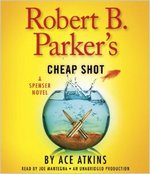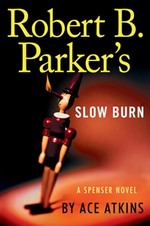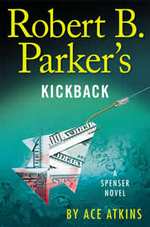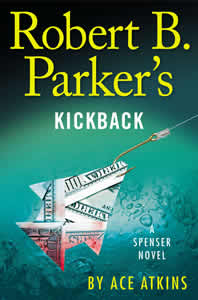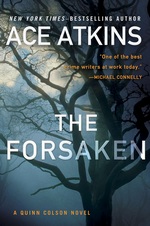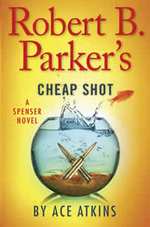by Ace Ace Atkins
Series: Spenser, #42
Hardcover, 320 pg.
Putnam Adult, 2014
Read: May 12 – 14, 2014
For 25 years or so, I’ve been a huge Robert B. Parker fan. Read everything I could get my hands on by him — mostly multiple times, even when the quality started to drop out and you could never tell which Parker you were going to get — the one that was close to his former greatness, or the guy who showed up, got his scheduled time in on the book and moved on with life. Even at his worst, there was always something to enjoy in his work — even if it was only a snippet of dialogue or a line or two of description.
As I’ve said before, when Dr. Parker died at his keyboard and they called in this Ace Atkins guy (had never heard of him), I was happy but cautious. Would he be able to pull it off? Would he sound like Parker without doing a cheap rip off? But I liked what Atkins did. So much that I waited a year to review Lullaby, and I haven’t reviewed Wonderland yet (spoiler alert: loved it. Always wanted a Henry-centric novel) — I just didn’t want to geek out and just go fanboy all over them — I wanted to reflect on them some before discussing them (I’m choosing to ignore what I thought about Silent Night: A Spenser Holiday Novel for now). But with Cheap Shot, I’m throwing caution to the wind, and will just talk about it now. And yeah, I’m all Fanboy.
On the one hand, this is not Atkins’ best Spenser. But it’s the one that feels like Parker more than the rest (make of that what you will). The banter, the poking around and stirring things up until you get a break, the fisticuffs, the donuts, the gun fight, the needling of underworld players, and so on — he captures Parker’s voice and pacing better here than he’d managed before (yet doesn’t come across as pastiche). Spenser’s sniffing around the big money and big boys (and a few men) in sports, which serve as a good place for Spenser to reflect how men are to act. Parker did this Mortal Stakes and Playmates (and to lesser extents elsewhere — like Early Autumn), and Atkins is able to do that here (arguably he does so with a subtlety that Parker didn’t achieve).
Kinjo Heywood’s a fun character — slightly more grounded than Mortal Stakes‘ Marty Rabb, far more mature and grounded than Playmates‘ Dwayne Woodcock. One advantage Heywood has is his son, Akira (who’s plenty of fun on his own) — he has someone to provide a good example to, and he strives to. Heywood also seems to have thought ore about life and how one should live it. Marty seemed to think only about Linda (his wife) and baseball, Dwayne was all about his girlfriend (Chantel) and basketball, too — but with less self-examination, it’s just that’s all he had the chance to think about (although Chantel would see that changed, and his horizons broadened if she had anything to say about it). Heywood’s got a kid, he’s been through a divorce, and is fully aware of his place in the limelight (including social media) and his own shortcomings. This alone saves the book from being a reworking of Parker.
I should add that Sixkill has a lot of perspective here (with the assistance of Atkins’ own background in football) — he was close to Heywood’s level, and if he’d made one or two better choices, he would’ve been at this level. He has a better idea what’s going on in Heywood’s mind than Spenser and his brief stint in the boxing world would.
The book begins with Spenser doing bodyguard duty — and as always (Stardust, Looking For Rachel Wallace, A Savage Place, Rough Weather) things don’t go well. You’d think people’d stop hiring him for this kind of work. Spenser turns to investigating — and unearthing lie after lie from his client — while getting Hawk and Sixkill to pitch in on the bodyguard front.
In addition to the main characters, Hawk, Susan, Sixkill, Tony Marcus, and so on; Atkins continues to show a command and familiarity with the impressive gallery of supporting characters in the Spenser-verse (although my gut tells me we’ll never see Atkins’ Spenser crossing paths with anyone from Paradise, Mass.). And the new characters fit into the ‘verse just fine, nothing that Parker wouldn’t have created. One character who started off the novel being opposed to Spenser’s hiring and further involvement with the case came around pretty quickly — and really without warning. I’m not sure that change was warranted by the text (and even if warranted, it was really easy for this guy to come around to Spenser’s side.)
Not only did Atkins give us a good story this time, he appeared to be planting and/or watering seeds for future books at the same time — something Parker never bothered with, but I’m glad to see (if only because it indicates Atkins plans on sticking around).
This one’s getting 5 Stars from me. May not be the best book (or one of the best) that I’ll read this year — but it made me happy, made me want to read more in this series (both prior to and post- this one), made me want to read the next non-Spenser Atkins novel more. And that’s good enough for me.
Next time, Mr. Atkins? Paul. We need to see Paul again. Please?
—–




